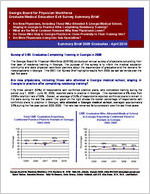Georgia Board for Physician Workforce Graduate Medical Education Exit Survey Summary Brief:
Are New Physicians, Including Those Who Attended A Georgia Medical School, Staying in Georgia to Practice After Completing Residency Training?
What are the Most Common Reasons Why New Physicians Leave?
Do Those Who Stay in Georgia Practice in Close Proximity to Their Training Site? Are More Physicians Going Into Sub-Specialties?
Summary Brief 2009 Graduates - April 2010
Survey of GME Graduates Completing Training in Georgia in 2009
The Georgia Board for Physician Workforce (GBPW) conducts an annual survey of physicians completing their final year of residency training in Georgia. The purpose of this survey is to inform the medical education community and state physician workforce planners about the experiences of graduates and the demand for new physicians in Georgia. This GME Exit Survey Brief highlights results from 2009, as well as trends over the last five years.
Are new physicians, including those who attended a Georgia medical school, staying in Georgia to practice after completing residency training?
Fifty three percent (53%) of respondents with confirmed practice plans, who completed training during the period July 1, 2008 June 30, 2009, reported plans to practice in Georgia. This represented a 6% drop from 2008's retention rate of 59%. Overall, an average of 52% of respondents reported confirmed plans to remain in the state during the last five years. The graph on the right shows the overall percentage of respondents with confirmed plans to practice in Georgia, who attended a Georgia medical school, averaged approximately 33% during the five year period 2005-2009. The rate has remained fairly consistent over the last three years.
Percentage Percentage
Total GME Graduates Reporting Confirmed Practice Plans to Remain in Georgia
2005-2009
100
90
80
70
59%
60 50% 50%
50
46%
40
30
20
10
0
53%
2005 2006 2007 2008 2009
GME Graduates Who Attended Medical School in Georgia Reporting Confirmed Plans to Remain in Georgia 2005-2009
100 90 80 70 60 50 40 27% 30 20 10 0
2005
38% 2006
32% 2007
34% 2008
32% 2009
Georgia Board for Physician Workforce 1718 Peachtree St., N.W., Suite 683, Atlanta, Georgia 30309, (404) 206-5420 www.gbpw.georgia.gov Cherri Tucker, Executive Director. Kelly McNamara, Carla Graves, Colette Caldwell, and G.E. Alan Dever, M.D., Ph.D., contributors.
GME Exit Survey Summary Brief 2009 Graduates
Page 2
What are the most common reasons why new physicians leave?
The top reasons cited by residents that changed their practice plans were: proximity to family; better jobs in desired locations outside of Georgia; better salary offered outside of Georgia; and never intended to practice in Georgia.
Do those who stay in Georgia practice in close proximity to their training site?
Nearly 75% of respondents remaining in the state reported plans to practice within a 60 mile radius of their residency program location. Residency training lasts a minimum of three years. During this time, residents not only treat patients, but they also establish ties in the local community.
GME Graduates Reporting Confirmed Practice Plans in GA, by Proximity to Training Location, 2009 (N=132)
60% 40% 20%
0%
49%
25%
26%
Same City/County of
Residency Training
Same Region as Residency
Training (Within a 60 Mile Radius)
Other Area in Georgia (More than 60 Miles from Training
Site)
The graph shows that for 2009, 49% of the respondents staying in Georgia are practicing in the same city/county of their residency training. Additionally, 25% of respondents reported plans to practice in the same region as residency training. These rates illustrate the contribution residency programs make to Georgia's supply and distribution of physicians.
Are more physicians going into sub-specialties?
Graduates were asked to indicate what their primary activity would be following completion of residency training. The rate of respondents going on for additional sub-specialty training remained fairly consistent from 2005-2007. The rate dropped 3% between 2007 and 2008. Then between 2008 and 2009, the rate of respondents pursuing subspecialty training rose by 11% (from 19% in 2008 to 30% in 2009).
GME Respondents Reporting Sub-Specialty Training as Primary Activity Upon Completion of Current Training
2005-2009
60
Percentage
40 23%
20
21%
22%
19%
30%
0 2005 2006 2007 2008 2009
The purpose of the Georgia Board for Physician Workforce is to address the physician workforce needs of Georgia communities through the support and development of medical education programs. In this role, the GBPW works closely with medical schools and teaching hospitals throughout the state. All direct state funding to support medical education, with the exception of money appropriated through the Board of Regents, is administered by the GBPW. The GBPW is also responsible for identifying areas of the state in which unmet priority needs exist for physicians by monitoring and evaluating the supply and distribution of physicians by specialty and geographical location.
Please visit the GBPW's website (www.gbpw.georgia.gov) for a copy of the full 2009 GME Exit Survey Report, as well as other useful publications related to Georgia's medical education system and the state's physician workforce.
